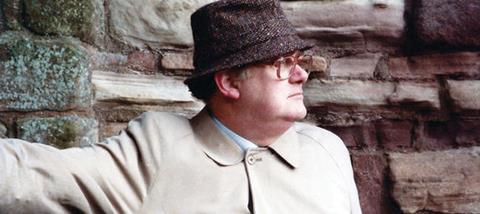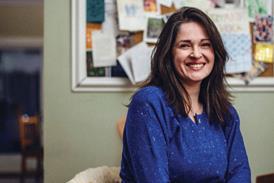
When BBC Radio 4 announced its Man of the Year award in 1981, voted for by listeners, Gerald Priestland was the runner-up, coming in just after the Pope. What had propelled him into the public consciousness was a 13-part radio series, Priestland’s Progress, in which he investigated the key beliefs of the Christian faith.
With his tweed jacket and public school accent, it may come as no surprise that Priestland’s early experience of Christianity consisted of chapel services at Charterhouse School. But required churchgoing often gives students just enough religion to inoculate them against it. So it was with Priestland, who decided he was an atheist in his teenage years; a point of view he carried into adulthood.
The 1950s and 60s brought him a successful career in broadcasting with the BBC, primarily as a foreign correspondent. He also had the unexpected responsibility of anchoring the technically fraught opening night of newly launched channel BBC Two.
However, when Priestland suffered a nervous breakdown in the early 70s, he became open to a spiritual dimension and subsequently made his home among the Quakers (the Religious Society of Friends). This was followed by a move into the BBC’s religious broadcasting, where he served as religious affairs correspondent for several years.
GROUNDBREAKING RADIO
Priestland’s Progress was conceived by Chris Rees, an evangelical Christian who worked as a BBC radio producer. It was to be one man’s exploration of the key aspects of the Christian faith, including prayer, worship, the Trinity, Jesus, and the cross. In the course of creating the 13 episodes, Priestland interviewed more than 100 people and gathered more than 48 hours of material, as well as writing an accompanying book (BBC Books).
The series was entirely original for its day. Firstly, there was the variety of people interviewed, ranging from comedian Spike Milligan to various Anglican bishops. It was also notable for ditching the usually impersonal and objective approach that was de rigueur for the BBC. Instead, Priestland took listeners on a personal journey, in which he gave his own reactions to each topic as his personal understanding developed.
The connection the programmes established with radio listeners was unprecedented. The Sunday night audience quadrupled, and the series generated the largest volume of correspondence a BBC radio programme has ever received: more than 22,000 letters. The Daily Mail ran a headline article titled: ‘The man who has got us talking about God’.
Rees recalls a well-known television personality who got in touch: ‘He said, “Thank you so much for this series. I can now talk about my faith at dinner parties, whereas before I couldn’t.” It became “cool” to talk about what you believed.’
As for the letters, Rees recalls how some wrote that they ‘had learned more about their faith in 45 minutes than they had in 45 years of churchgoing’. He subsequently met five clergy who traced their entry into ministry back to the influence of the programme.
Rev Patrick Forbes, who worked as a researcher on the series, read approximately 17,000 of the letters, passing on any that were relevant to Priestland. ‘Gerald, being the Christian he was, wanted to know of any letter that evidenced pastoral need so that he could respond in person.’
A JOURNEY OF DISCOVERY
What had so captured the attention of the British public? Part of the attraction seemed to lie in the fact that Priestland himself was no expert. As a relatively recent Quaker adherent, he freely admitted that he had little familiarity with Christian theology. His own view of God was relatively nebulous and unformed.
In the accompanying book, he wrote: ‘High churchmen feared we would be too low, low churchmen were afraid we would be too high, and both were suspicious that I might convert the operation into a vehicle for my own Quaker heresies.’
Yet his journey through the various strands of Christian belief was to be an eye-opening experience for the broadcaster. He didn’t just speak to bishops and theologians, but also to everyday Christians, many of them women (which was still relatively unusual in religious broadcasting in those days).
HIS OWN VIEW OF GOD WAS RELATIVELY NEBULOUS AND UNFORMED
The style was often touching and personal, such as the interview with Christine Parkin, a Salvationist, who spoke about praying for her young son’s acute eczema. From that day on, the condition improved, although the family still lived with it. ‘But now I know it’s not only my problem, but God’s,’ she related in a moving interview with the journalist. ‘I know God is in the midst of pain and misery.’
MEETING CHRIST
As Priestland himself came to better understand the rich depth of people’s experiences of God, so a fresh understanding of the depth of Christian faith also unveiled itself to him. ‘He learned a lot about what the Church teaches,’ says Rees, ‘but on the other hand the journey was one of his own commitment and response. It was evident to most people who knew him that there had been a change in Gerald; the big impact it had on his life and his faith.’
One of the final interviewees for the programme was the nearly blind Bishop of Winchester, John Taylor. ‘We talked to him for well over an hour,’ recalls Rees. ‘Gerald asked, “What was happening at Calvary?” John Taylor embarked on a 14-minute answer to a question which summed up everything about what Jesus’ life, death and resurrection was about. I looked across and saw Gerald crying.’
Now, more than 30 years later, we have the opportunity to listen again to a radio series that not only transformed religious broadcasting, but also the spiritual life of its presenter.
CHRISTIANITY ON THE AIRWAVES: landmark moments in UK religious radio
CS Lewis at the BBC
CS Lewis’ wartime broadcasts gave a layperson’s guide to Christianity. They were phenomenally popular and the material would become the basis of Lewis’ classic book Mere Christianity (William Collins).
Thought for the Day
The weekday morning Radio 4 slot has been in existence since 1939 (initially titled Lift up Your Hearts). Today it features a variety of religious representatives but still refuses to include atheist voices, despite pressure from secular groups.
Premier Christian Radio
The UK’s first dedicated Christian radio station began in 1995, broadcasting to London and the South East. It now broadcasts nationally and has a sister station, Premier Gospel.
Listen to Priestland’s Progress on Premier Christian Radio every Saturday at 1pm or via Priestland's Progress.
Click here to receive your free copy of Premier Christianity magazine.



























